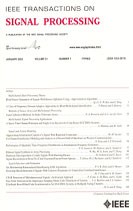Paper published in IEEE Transactions on Signal Processing

The paper "NOMA-based Improper Signaling for Multicell MISO RIS-assisted Broadcast Channels,", co-authored by Mohammad Soleymani, Ignacio Santamaria, Eduard Jorswieck, and Sepehr Rezvani has been published in IEEE Transactions on Signal Processing and is available on IEEE Xplore, DOI:10.1109/TSP.2023.3259145.
Abstract.- In this paper, we study the performance of reconfigurable intelligent surfaces (RISs) in a multicell broadcast channel (BC) that employs improper Gaussian signaling (IGS) jointly with non-orthogonal multiple access (NOMA) to optimize either the minimum-weighted rate or the energy efficiency (EE) of the network. We show that although the RIS can significantly improve the system performance, it cannot mitigate interference completely, so we have to employ other interference-management techniques to further improve performance. We show that the proposed NOMA-based IGS scheme can substantially outperform proper Gaussian signaling (PGS) and IGS schemes that treat interference as noise (TIN) in particular when the number of users per cell is larger than the number of base station (BS) antennas (referred to as overloaded networks). In other words, IGS and NOMA complement to each other as interference management techniques in multicell RIS-assisted BCs. Furthermore, we consider three different feasibility sets for the RIS components showing that even a RIS with a small number of elements provides considerable gains for all the feasibility sets.

